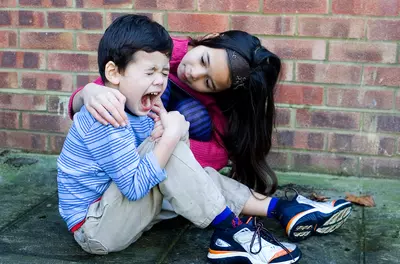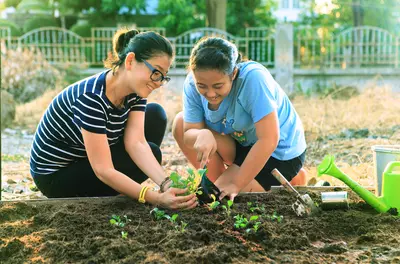Nurture Your Relationships

Relationships aren't static—they are living, dynamic aspects of our lives that require attention and care. In order to benefit from strong connections with others, you should take charge of your relationships and put in the time and energy you would any other aspect of your wellbeing.
Connect with your family
One of the biggest challenges for families to stay connected is the busy pace of life. But Blue Zones research states that the healthiest, longest-living people in the world all have something in common: they put their families first. Family support can provide comfort, support, and even influence better health outcomes while you are sick. Relationships and family author Mimi Doe recommends connecting with family by letting little grievances go, spending time together, and expressing love and compassion to one another.
Of course, the same practices apply to close friends as well. This is especially important if you don’t have living family, or have experienced difficult circumstances, such as abuse, that would make it difficult for you to connect with your relatives.
Develop your relationship skills

Practice gratitude
Gratitude is one of the most accessible positive emotions, and its effects can strengthen friendships and intimate relationships. One 2010 study found that expressing gratitude toward a partner can strengthen the relationship, and this positive boost is felt by both parties—the one who expresses gratitude and the one who receives it. Remembering to say “thank you” when a friend listens or your spouse brings you a cup of coffee can set off an upward spiral of trust, closeness, and affection.

Learn to forgive
It’s normal for disagreements or betrayal to arise in relationships, but your choice about how to handle the hurt can have a powerful effect on the healing process. Choosing to forgive can bring about a variety of benefits, both physical and emotional. Fred Luskin, head of the Stanford Forgiveness Project, says it’s easier to let go of the anger or hurt feelings associated with a circumstance if you remind yourself that much of your distress is really coming from the thoughts and feelings you are having right now while remembering the event—not the event itself.

Be compassionate
Compassion is the willingness to be open to yourself and others, even in painful times, with a gentle, nonjudgmental attitude. When you feel compassionate toward another person—whether a romantic partner, friend, relative, or colleague—you open the gates for better communication and a stronger bond. This doesn’t mean taking on the suffering of others, or absorbing their emotions. Rather, compassion is the practice of recognizing when someone else is unhappy or whose needs aren’t being met and feeling motivated to help them. We are an imitative species: when compassion is shown to us, we return it.

Accept others
It is also important to be accepting of the other person in the relationship. Obviously, this does not apply in situations of abuse or unhealthy control, where you need foremost to protect yourself. But otherwise, try to understand where the person is coming from rather than judge them. As you do for yourself, have a realistic acceptance of the other's strengths and weaknesses and remember that change occurs over time.

Create rituals together
With busy schedules and the presence of online social media that offer the façade of real contact, it’s very easy to drift from friends. In order to nurture the closeness and support of friendships, you have to make an effort to connect. Gallup researcher Tom Rath has found that people who deliberately make time for gatherings or trips enjoy stronger relationships and more positive energy. An easy way to do this is to create a standing ritual that you can share and that doesn’t create more stress—talking on the telephone on Fridays, for example, or sharing a walk during lunch breaks, are ways to keep in contact with the ones you care about the most.

Balance social and alone time
Gallup researchers Jim Harter and Raksha Arora found that people who spend 6-7 hours per day socializing (which could mean hanging out with friends, sharing meals with family, or even emailing a colleague) tend to be the happiest. In contrast, those who have zero interactions (or an exhausting overload of social time) feel more stressed. Knowing when to give your time to others and when to take some time for yourself can be crucial in maintaining balanced, healthy relationships as well as emotional wellbeing.
Try a guided forgiveness meditation
This guided forgiveness practice has three steps: We begin with those whom we have caused harm, intentionally or unintentionally. Next we turn our attention to those who have similarly caused us harm, intentionally or unintentionally. And, finally, we turn our attention to self-forgiveness, for ways we may have harmed ourselves, intentionally or unintentionally. You can repeat this process with the same or different people as often as you wish.
http://www.ofspirit.com/mimidoe1.htm
Algoe, S. B., Gable, S. L. & Maisel, N. C. (2010). It's the little things: everyday gratitude as a booster shot for romantic relationships. Personal Relationships, 17: 217–233.
Brown, B. (2012). Brené Brown: How Vulnerability Holds the Key to Emotional Intimacy. Spirituality & Health; November-December. Retrieved March 11, 2013 from http://spiritualityhealth.com/articles/bren%C3%A9-brown-how-vulnerability-holds-key-emotional-intimacy.
Gottman, J. (2011). The science of trust. New York: W.W. Norton & Company.
Harris, A.H, Luskin, F.M.., Benisovich, S.V., Standard, S., Bruning, J., Evans, S. and Thoresen, C. (2006) Effects of a group forgiveness intervention on forgiveness, perceived stress and trait anger: A randomized trial. Journal of Clinical Psychology. 62(6) 715-733.
Harter, J.K., Arora, R. (2008, June 5). Social time crucial to daily emotional well-being in U.S. Retrieved February 28, 2013, from http://www.gallup.com/poll/107692/social-time-crucial-daily-emotional-wellbeing.aspx.
Lambert, N.M., et. al. (2010). Benefits of expressing gratitude: expressing gratitude to a partner changes one’s view of the relationship. Psychological Science; 21(4), 574-580.
Neff, K. (2011). Self-Compassion. New York: Harper Collins.
Rath, T., Harter, J. (2010). Wellbeing: The five essential elements. New York: Gallup Press.
Rosland, A., Heisler, M., J.D. Piette. (2012). The impact of family behaviors and communication patterns on chronic illness outcomes: a systematic review. Journal of Behavioral Medicine; 35(2), 221-239.



